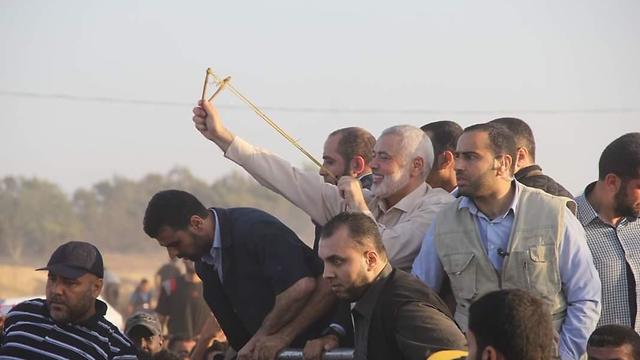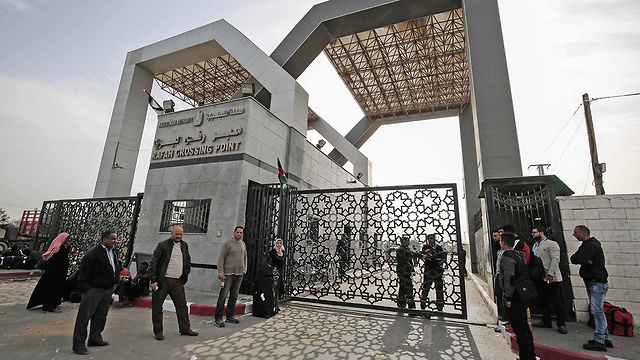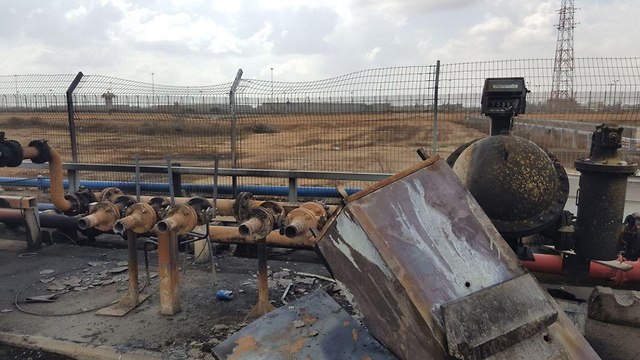
Hamas's Ismail Haniyeh
Photo: AFP

Haniyeh to leave for Egypt before next week's protests
Hamas chief Ismail Haniyeh to convene with General Intelligence Directorate head Abbas Kamel, accompanied by small delegation; Haniyeh will return to Gaza before March of Return protests culminate with US Embassy opening, Nakba Day; Palestinian source tells Ynet Hamas profits from PA-controlled Kerem Shalom crossing closure; kite terrorism continues.
Hamas leader Ismail Haniyeh is expected to leave Sunday for a speedy visit to Egypt to meet with the head of the country's General Intelligence Directorate Abbas Kamel, days before the culmination of the "March of Return" campaign next week with the opening
of the new US Embassy in Jerusalem and Nakba Day.


Haniyeh's urgent meeting was set due to the March of Return protests scheduled to take place Monday, a day before Nakba Day—the annual day marking the Palestinian "catastrophe" at Israel's founding—which Israel fears will lead to an escalation in Gaza border region hostilities.
Haniyeh will be accompanied by a very limited number of people and is expected to return to Gaza in time to participate in the mass protests. Hamas's leader in Gaza Yahya Sinwar, meanwhile, will not leave the strip.

Hamas's Ismail Haniyeh aims slingshot during Friday's border protests. He will leave for Egypt Sunday
The kite terrorism campaign has also been continuing, with a wheat field being set ablaze in the Mefalsim kibbutz in the Sha'ar HaNegev Regional Council. Previously, a field near Be'eri was torched.
During Friday's weekly border protest, Palestinian protesters set fire to the Palestinian side of the Kerem Shalom crossing, causing heavy damages estimated to range in the tens of millions of shekels and prompting Defense Minister Avigdor Lieberman to announce the crossing's closure until further notice.
Footage of the fire at the crossing (צילום: דובר צה"ל)
The strip's energy companies announced after the closure that a shortage of cooking gas could already be felt in Gaza—and that it will only intensify as a result of the Israeli decision.
The committee organizing the protests issued a statement following the arson, dubbing it a "regrettable incident" and calling to preserve the crossings and national infrastructures providing services to Gazans.
However, the committee deliberately refrained from directly denouncing protesters, and fingered Israel as the culprit for the fire due to the heavy tear gas usage that led to many Palestinians becoming trapped in the same place.
A Palestinian source in Gaza, meanwhile, told Ynet that Hamas has been profiteering considerably as a result of the crossing's destruction. The Kerem Shalom crossing is operated by the Palestinian Crossings Authority, which is controlled by the Palestinian Authority (PA) rather than Hamas, he noted.
The source then explained that Hamas was encouraging rioters to damage crossings, thereby causing the PA to lose revenue from customs and other taxes levied on incoming goods.
Bringing the goods in through the Rafah border crossing, the source added, will allow Hamas to pocket such tax levies.
On the same matter, Egypt opened the Rafah crossing Saturday, and it is expected to stay open for the next four days—until after the mass protests.

Hamas seeks to profit from goods being rerouted to the Rafah crossing, a Palestinian source said (Photo: AFP)
Senior Hamas official Fathi Hamad, a member of a more hawkish faction within the terror group, said last week that, "If Palestinians are not allowed to bring in all necessary goods into Gaza, these crossings will be destroyed in every sense of the word."
The Kerem Shalom crossing is the only such crossing allowing bringing in goods from Israel to Gaza. Some 2,370 trucks pass through the crossing every week bearing goods—72,000 tons of construction materials, food, agricultural products and medications.
In addition, it's also used to bring into Gaza 607,000 liters of petrol, 3,200 liters of diesel fuel and 1,500 tons of gas.
















